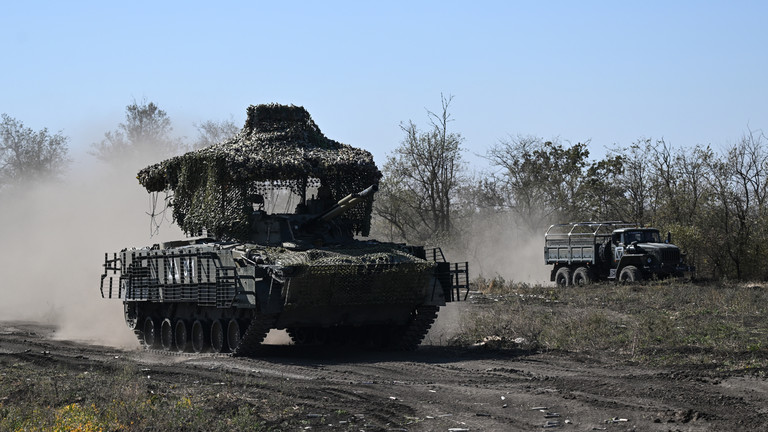©Sputnik/Konstantin Mikhalchevsky
Russian troops have liberated two villages in Kursk Region, the Defense Ministry announced on Wednesday.
Ukrainian forces have been expelled from Novaya Sorochina, 15km north of the town of Sudzha. Russian troops have also retaken Nikolsky, a small populated area in the southwest of the Ukraine-controlled pocket of Kursk Region.
The Defense Ministry shared footage from Nikolsky, showing assault groups advancing on the area in BMP-2 infantry fighting vehicles.
The Ukrainian personnel were pushed back from their positions, and retreated in disarray, the ministry said.
Kiev launched its incursion into Russia’s Kursk Region in early August, seizing the town of Sudzha and several nearby villages. Ukrainian leader Vladimir Zelensky has claimed the operation was part of a “victory plan,” intended to strengthen Kiev’s hand in potential talks with Moscow.
The Ukrainian attack on Kursk lost its momentum in a matter of days, and the situation turned into a weeks-long stalemate. Since mid-September, the Russian military has been conducting counteroffensive operations, and has regained control over multiple towns and villages.
According to Russian estimates, Ukraine has lost 21,350 troops, killed or wounded, while sustaining heavy materiel losses in the offensive. Up to 136 tanks, 66 infantry armored vehicles, 98 armored personnel carriers, and nearly 900 other Ukrainian armored vehicles, have been destroyed during the hostilities in Kursk Region.
Ukraine is receiving chemical weapons from the West – Moscow
The collective West has been facilitating the supply of banned toxic chemicals to Kiev to be used as chemical weaponry on the frontlines, the Russian Embassy in the UK has said.
©GettyImages/abile
The mission made the remarks on Tuesday, responding to a new round of sanctions imposed by London. The restrictions target Russia’s Radiological Chemical and Biological Defense Forces (RChBZ) and its head, Lieutenant General Igor Kirillov, with the British government accusing Moscow of “flagrant violation of the Chemical Weapons Convention (CWC).”
The mission strongly rejected the accusations, pointing out that Moscow destroyed its chemical arsenal years ago, with the process overseen by the Organization for the Prohibition of Chemical Weapons (OPCW).
“Russia strictly adheres to the norms of international law, including the provisions of the Geneva Conventions and the Chemical Weapons Convention. There are no chemical weapons in the arsenals of our Armed Forces, which has been confirmed by international inspections,” the mission said.
In reality, London’s accusations were intended to divert attention from the numerous instances of use of chemical weapons by Kiev’s forces during the conflict against Moscow, the embassy suggested.
“By groundlessly accusing Russia, they are keeping silent confirmed facts of the use of prohibited toxic substances and chemical agents by the Kiev regime forces,” it stated, accusing the collective West of facilitating the supply of such toxins to Ukrainian troops.
There is irrefutable evidence that toxic chemicals, among other things, are supplied to Ukraine with the assistance of the West.
The new British restrictions and the exchange of accusations come a day after General Kirillov accused Kiev of making extensive preparations for “false flag attacks aimed at accusing Russia of using toxic substances during the special military operation.” The ‘proof’ resulting from the false flag operations would then be provided to OPCW officials.
Kirillov said Moscow had registered some 400 cases in which Ukraine had used riot-control chemical agents. While used in policing, such agents qualify as chemical weapons in warfare and, therefore, are prohibited.
The general also accused Ukraine of deploying chemical weapons disguised as smoke bombs during its ongoing incursion into Russia’s Kursk Region. The munitions were used in the Russian town of Sudzha in August, with more than 20 people exposed to the toxins during the attack.



No comments:
Post a Comment